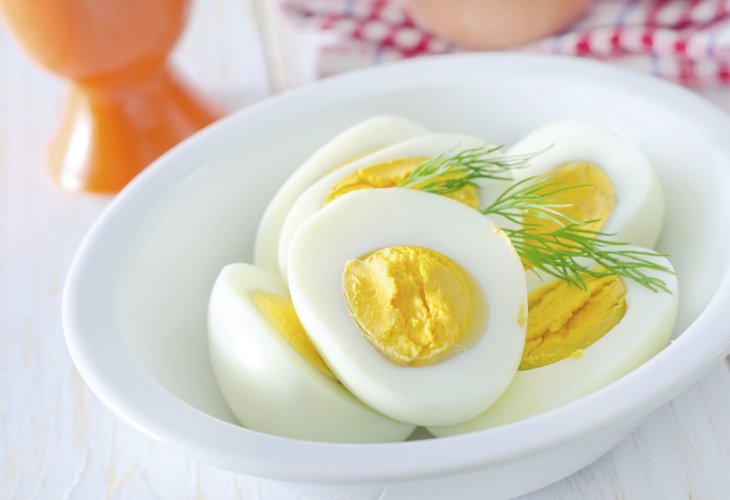The Surprise Egg
What's the problem with eggs and garlic "sleeping" outside the refrigerator? And how do you prepare an omelet at dawn?

For us, consumers of kosher and mehadrin food, it has long been simple and clear that the food we purchase is not only kosher but also seven times cleaner and healthier than its non-kosher counterpart. This is true even when the non-kosher equivalent is under the supervision of some health or quality standard. It turns out that due to the constant inspections and vigilance of the kosher supervisors, business owners are also careful not to be caught in other improprieties.
Take for example the whole issue of pest control. While kosher certification bodies emphasize that pest control should include all storage pests, even the smallest ones, like flour moths and the like, other health organizations do not emphasize this and only require pest control for cockroaches and larger pests. Or for instance, while we insist that legumes susceptible to infestation, such as sesame and rice, be stored in a cool place to prevent infestation, health organizations will insist they be stored in a warm, dry place, even though sesame and chickpeas will become infested without anyone checking and sorting them.
Kosher food is healthier because we know things that various supervisory bodies have not yet discovered, and we follow the words of our sages who forbade eating things that pose a danger, such as peeled garlic, onion, and eggs that have been left overnight, which pose a tangible danger of incurable diseases, as attested to in our generation by the Admor of Sanz, of blessed memory, author of the "Divrei Yatziv."
To better understand, let's preface: The Gemara used severe expressions regarding eating peeled garlic, onion, or egg that have been left overnight. In practice, almost all poskim unanimously agreed that peeled garlic or onion that remained overnight are forbidden to eat, but opinions differ regarding peeled eggs. Some argue that the prohibition applies only to cooked eggs and not to raw ones, and some forbid raw eggs only if the yolk has been separated from the white. But since the danger here is very serious, the poskim, led by Maran Maor Yisrael of blessed memory, instructed to be stringent with any peeled egg, and even liquid eggs mainly used in the food industry, if they remained overnight, it is forbidden to eat them. However, if the eggs were mixed with salt or oil in a way that their taste is noticeable in the eggs, the danger dissipates and it is permissible to leave them peeled overnight.
Let's remember that in places where the kashrut is not mehadrin, it is not certain at all that they are careful about this, and it is very possible that you will eat peeled garlic, onion, or egg that have been left overnight, without having been mixed with salt or oil.
Liquid eggs - A simple and ingenious invention by factories that mix the eggs for us, to provide an easy solution for bakeries or pastry shops that consume large quantities of beaten eggs and want to save themselves the time of opening and checking the eggs. Many restaurants also use liquid eggs to fry omelets at lightning speed. But the production process of the liquid also requires kosher supervision, from sorting the eggs to prevent liquid from broken eggs, which have a high risk of worm formation, from mixing with the egg liquid, to checking the egg for blood. But to save it from the prohibition of overnight stay, mehadrin kashrut bodies mix between 1% to 2% salt in the liquid used for baking burekas and other savory items, and in the liquid used for baking sweets like rugelach and the like, they mix between 2% to 4% sugar.
Preserved hard-boiled eggs - Now that the sandwich and toast industry has developed, and the demand for hard-boiled eggs has increased, an entire industry has emerged marketing boiled eggs that are peeled or as omelets. In places where the kashrut is at the Badatz level, the eggs undergo a process of soaking in salt water with other flavor additives, until all parts of the egg, even the innermost, absorb the taste of salt and additives, thus being exempt from the prohibition of overnight stay. Also, the eggs are considered as "mixed with salt," as they are soaked in the salt water.
By the way, "left overnight" - when harmful elements take over the peeled eggs, does it mean passing the point of midnight, since according to the Kabbalists until midnight the "judgments" rule, and from midnight onward it is already considered morning? So if you were late in your studies and only close to midnight did you find time to fry an omelet, but while you were busy with the egg, midnight passed, would this be considered as having "passed the night"? Or perhaps the time considered as "passed the night" is the time of dawn, like the time requiring morning hand washing because of the spirit of impurity, so that if you woke up early to prepare for Shabbat and the garlic was peeled before dawn, the garlic would be forbidden after dawn. Indeed, some ruled this way and some ruled that way. In practice – the time that the poskim determined would be considered as "passed the night" is specifically if the garlic or onion and egg remained from the time before midnight until dawn.

